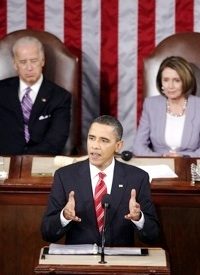
When President Barack Obama took office, a large segment of the American population had such unrealistically high expectations for him — he was “the Messiah” who would save us after eight years of Republican misrule and usher in a new era of liberty, equality, and fraternity — that he was bound to disappoint them.
For most, it appears, the bloom is indeed off the rose. The ongoing, worsening war in Afghanistan; the healthcare “reform” bill that was nothing but a sop to the big insurance and pharmaceutical companies; the stagnant economy; the bailouts of banks, automakers, and even foreign countries; the potentially felonious job offers to Democratic primary candidates; and the seemingly eternal BP oil spill have all contributed to Obama’s most recent job approval rating of 46 percent — lower than both George W. Bush’s and Bill Clinton’s ratings at this same point in their respective tenures.
Perhaps the best evidence of the President’s declining fortunes is this: He was able to get Congress to pass a massive healthcare mandate in March, but today, according to the Associated Press, he is struggling to get those same legislators merely to extend a health-insurance subsidy for the unemployed.
“Under a 1980s law known as COBRA,” reports the AP, “laid-off workers generally can stay on their former employers [sic] health plan for up to 18 months, provided they pay the full premium plus a small administrative charge. But with family premiums averaging about $13,500, the cost is prohibitive for most people.”
The AP continues: “That changed under the 2009 stimulus bill and subsequent expansions, which provided a 65 percent federal subsidy for up to 15 months. Workers laid off through May 31 can qualify for the benefit through their former employer.” But, says the AP, “despite pleas from President Barack Obama,” Congress has not extended the qualifying period, so anyone laid off after May 31 will have to foot the entire bill for his own health insurance rather than relying on Uncle Sam for most of it.
The main reason Congress has not renewed the program is that moderate Democrats “have rebelled against adding billions more to the deficit in a treacherous election year,” according to the AP. ObamaCare was sold as a deficit-reduction measure (although that, to no one’s great surprise, turned out to be a fraud), but it is impossible to portray a good old-fashioned wealth-transfer program as anything but more red ink.
There are also conservative Democrats, says the AP, who feel that the program is unfair in that it subsidizes some people’s health insurance but not others. The logical conclusion, then, is that they would be on board if the program were going to cost, oh, five or ten times as much just so long as everyone gets his fingers in the till.
Other Democrats, less budget hawk and more bleeding heart, want to extend the program to those who get laid off through November 30 and “want to attach their nearly $7 billion provision to must-pass legislation that would extend unemployment benefits and make changes in dozens of federal programs.” One of them, Sen. Bob Casey of Pennsylvania, said, “Now is not the time to pull up the ladder on people who are hanging on, in some cases to the last rung.” But when is? There are always similar excuses for continuing government programs. And why stop at the end of November? If it’s such a wonderful program, why not keep it going in perpetuity? For that matter, why pay only 65 percent, and why restrict it to certain individuals? (Answer: Democrats know their beloved programs would never be enacted if they tried to implement them all at once because the enormous cost and certain failure would be evident to all at the outset. Why else do they not, for example, immediately raise the minimum wage to $100 an hour instead of incrementing it a few cents at a time?)
Yes, it’s a very bad thing to be laid off and not to be able to afford health insurance. Yet why should an unemployed person’s neighbor, who may himself be out of a job, be forced to pay for that person’s healthcare?
Furthermore, if not for decades of government interference in the healthcare sector, now including the looming disaster of ObamaCare, the cost of care itself, and consequently that of insurance, would be within reach of the average person. The subsidy for the unemployed to purchase health insurance is just another of the government’s attempts to clean up the mess it’s made by doing more of what created the mess in the first place, and it is just as certain to fail as all previous attempts.
For now the good news is that Obama doesn’t appear to have the political capital to get even a modest (by Washington standards), seemingly compassionate subsidy passed. If the Democrats’ majorities in both houses of Congress are eroded or even eliminated in November, he’ll be in an even worse position.
The political class decries gridlock, of course, because it prevents the government from expanding at full throttle. But if we can’t expect the government to reverse course — and it shows no signs of doing so, nor would Obama allow it — then the best we can hope for is to stall the engine for a while. An “impotentate” in the White House is a good start.
Photo: Vice President Joe Biden and House Speaker Nancy Pelosi listen as President Barack Obama delivers his State of the Union address on Capitol Hill in Washington, Jan. 27, 2010: AP Images



